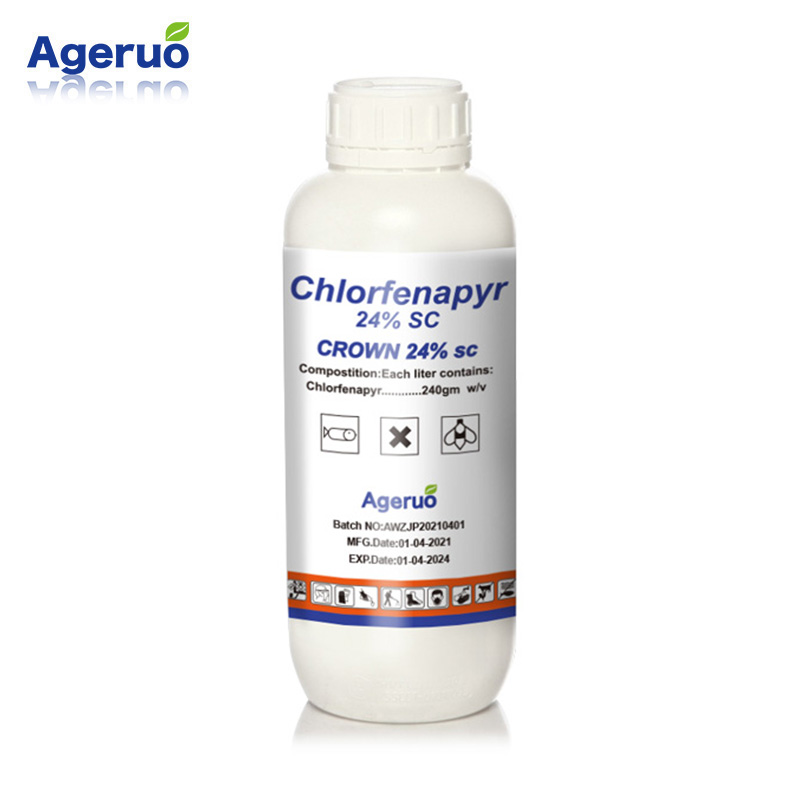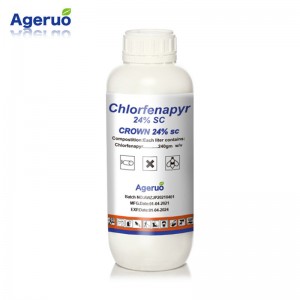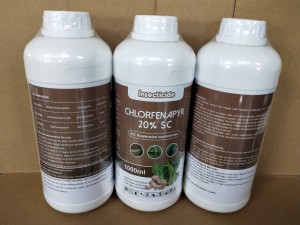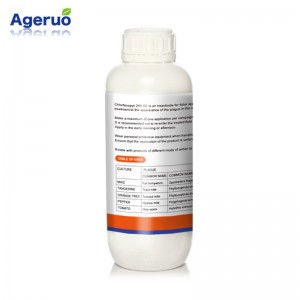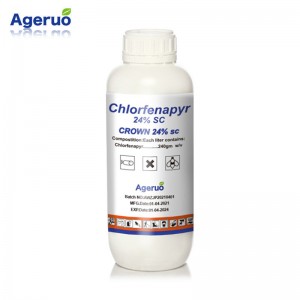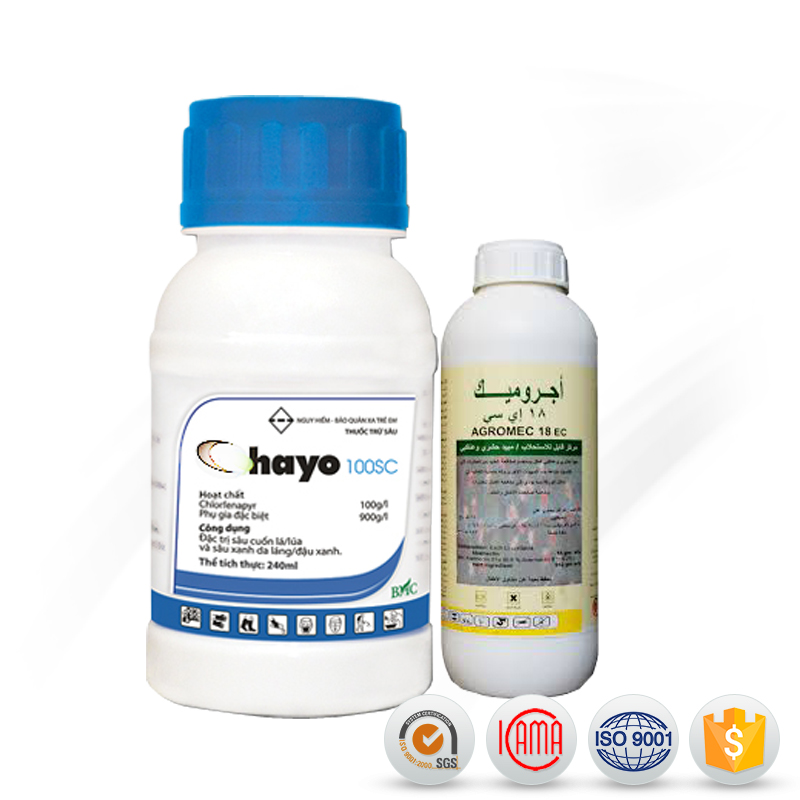Chlorfenapyr 20% SC 24% SC kills pests in ginger fields

Chlorfenapyr Introduction
| Product Name | Chlorfenapyr 20% SC |
| CAS Number | 122453-73-0 |
| Molecular Formula | C15H11BrClF3N2O |
| Application | Insecticide |
| Brand Name | Ageruo |
| Shelf life | 2 Years |
| Purity | Chlorfenapyr 20% SC |
| State | Liquid |
| Label | Customized |
| Formulations | 240g/L SC,360g/l SC, 24% SE, 10%SC |
| The mixed formulation product | 1.Chlorfenapyr 9.5%+Lufenuron 2.5% SC 2.Chlorfenapyr 10%+Emamectin benzoate 2% SC 3.Chlorfenapyr 7.5%+Indoxacarb 2.5% SC 4.Chlorfenapyr5%+Abamectin-aminomethyl1% ME |

Mode of Action
Chlorfenapyr is a pro-insecticide (meaning it is metabolized into an active pesticide upon entering the host), derived from compounds produced by a class of microorganisms called halopyrroles. It was registered by the EPA in January 2001 for use in non-food crops in greenhouses. Chlorfenapyr works by disrupting adenosine triphosphate production. Specifically, Oxidative removal of the N-ethoxymethyl group of chlorfenapyr by mixed-function oxidase leads to compound CL303268. CL303268 decouples mitochondrial oxidative phosphorylation , resulting in the production of ATP, cell death and ultimately biological death.
Application
Agriculture: Chlorfenapyr is used on a variety of crops to protect against pests that affect yield and quality. Structural Pest Control: Commonly used in buildings to control termites, cockroaches, ants, and bed bugs. Public Health: Employed to control disease vectors like mosquitoes. Stored Products: Helps in protecting stored food items from pest infestation. Chlorfenapyr’s broad-spectrum activity and unique mode of action make it a valuable tool in integrated pest management programs, especially in cases where pests have developed resistance to other insecticides.

Chlorfenapyr is effective against a wide range of pests, including various insects and mites. Here are some of the key pests it can control:
Insects
Termites: Chlorfenapyr is commonly used to control termites in structural pest management due to its ability to be transferred among colony members. Cockroaches: Effective against different species of cockroaches, including German and American cockroaches. Ants: Can control various species of ants, often used in baits or sprays. Bed Bugs: Useful in the control of bed bugs, particularly in areas with resistance to other insecticides. Mosquitoes: Employed in public health for mosquito control. Fleas: Can be used to manage flea infestations, particularly in residential settings. Stored Product Pests: Includes pests like beetles and moths that infest stored grains and food products. Flies: Controls house flies, stable flies, and other nuisance fly species.
Mites
Spider Mites: Widely used in agriculture to control spider mites on crops such as cotton, fruits, and vegetables. Other Mite Species: Can also be effective against various other mite species that affect plants.

How long does chlorfenapyr to work?
Chlorfenapyr typically begins to take effect within a few days after application. The exact time frame can vary depending on factors such as the type of pest, the environmental conditions, and the method of application.
Time to Effect
Initial Impact: Pests usually start showing signs of distress within 1-3 days. Chlorfenapyr interferes with the energy production processes in their cells, causing them to become lethargic and less active. Mortality: Most pests are expected to die within 3-7 days post-application. The mode of action of chlorfenapyr, which disrupts the production of ATP, leads to a gradual decline in energy, ultimately causing death.
Factors Influencing Effectiveness
Type of Pest: Different pests may have varying sensitivity to chlorfenapyr. For instance, insects like termites and cockroaches may show quicker responses compared to some mites. Application Method: The effectiveness can also depend on whether chlorfenapyr is applied as a spray, bait, or soil treatment. Proper application ensures better contact with pests. Environmental Conditions: Temperature, humidity, and exposure to sunlight can influence how quickly chlorfenapyr acts. Warmer temperatures may enhance its activity, while extreme conditions might reduce its effectiveness.
Monitoring and Follow-Up
Inspection: Regular monitoring of treated areas is recommended to assess the effectiveness of the treatment and determine if any additional applications are necessary. Reapplication: Depending on the pest pressure and environmental conditions, follow-up treatments might be required to maintain control. Overall, chlorfenapyr is designed to provide relatively quick and effective pest control, but the specific time to see full results can vary based on the factors mentioned above.
Using Method
|
Formulations |
Crop names |
Fungal diseases |
Dosage |
Usage method |
|
240g/LSC |
Cabbage |
Plutella xylostella |
375-495ml/ha |
Spray |
|
Green onions |
Thrips |
225-300ml/ha |
Spray |
|
|
Tea tree |
Tea green leafhopper |
315-375ml/ha |
Spray |
|
|
10%ME |
Cabbage |
Beet Armyworm |
675-750ml/ha |
Spray |
|
10%SC |
Cabbage |
Plutella xylostella |
600-900ml/ha |
Spray |
|
Cabbage |
Plutella xylostella |
675-900ml/ha |
Spray |
|
|
Cabbage |
Beet Armyworm |
495-1005ml/ha |
Spray |
|
|
Ginger |
Beet Armyworm |
540-720ml/ha |
Spray |
Packing

Why Choose US
Our professional team, with over ten years of quality control and effective cost compression, ensures the best quality at the lowest prices for export to various countries or regions.
All our agrochemical products can be customized. Regardless of your market needs, we can arrange professional personnel to coordinate with you and customize the packaging you require.
We will assign a dedicated professional to address any of your concerns, whether it’s product information or pricing details. These consultations are free, and barring any uncontrollable factors, we guarantee timely responses!









